Founded in 2004 and consisting of LucasArts veterans, Telltale Games has one mission: to create Point And Click Adventure Games that hark back to the days of old, yet hold their own in the modern gaming world. With their most recent offering: The Walking Dead, they have achieved this in spades, and the developers have certainly proved that a once-dead (excuse the pun) genre can still have considerable presence in modern gaming culture. Combing traditional gameplay 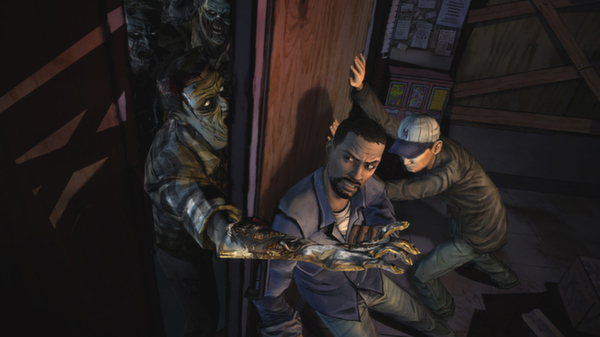 with modern gaming conventions in a TV-like shell, The Walking Dead is a triumph in not only Adventure games, but in game making as a whole, providing an extremely emotional and exciting package that sits high as one of the best games this generation.
with modern gaming conventions in a TV-like shell, The Walking Dead is a triumph in not only Adventure games, but in game making as a whole, providing an extremely emotional and exciting package that sits high as one of the best games this generation.
Starting at the time of the Georgia outbreak, you take control of Lee Everett, a criminal on his way to jail after committing a brutal murder. When his escort to jail goes awry, Lee finds himself a free man in the middle of a zombie apocalypse. While running away from the murderous creatures that plague the streets, Lee comes across Clementine, an 8 year old girl left alone amongst the ensuing chaos. The whole season chronicles both characters journey through America as they try to survive and find solitude away from the zombie infection. The situations the characters find themselves in are far from original, but they are approached in such a way that they feel fresh nonetheless. Five individual episodes make up this game, and each are presented in a TV show format. This is more than just a gimmick, with the direction of the on-screen action being very ‘filmic’, and tension being maximised at every turn. The game even has episode re-caps and ‘coming soon’ videos at the start and end of each episode respectively. They aren’t anything too special, but they have a certain charm.
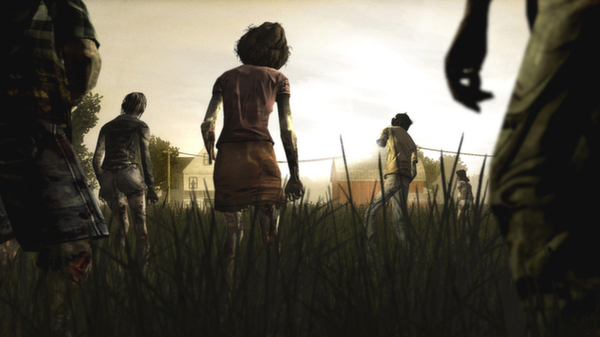 Despite having a premise which could certainly go into such territory, it’s good to see that The Walking Dead steers well clear of zombie movie cliché. Maybe this is down to the fact that the game concentrates more on survival and tension, rather than the scares and shock tactics you would expect. While some gamers might be disappointed by the lack of horror, the concentration on survival is what differentiates this game on the market, and it certainly keeps this game in check with the franchises roots. This isn’t to say that the game doesn’t plunge into the grim reality of the situation; it just approaches them without getting bogged down in unnecessary horror conventions and cinematography. With the stark reality of the situation being presented to us in droves, this game certainly does tug at the heart strings, and the emotional attachment you form to the characters (particularly that of Lee and Clem) goes far to heighten the emotion. To call this game ‘grim’ is merely an understatement. Shocking, grotesque and horrifying things are witnessed in this game, and unlike most horror games/films these days, they serve a purpose, and are not there to simply ignite a disgusted reaction from the audience. This games backbone is the characters, and so character development makes up a huge proportion of the game, of which these events contribute to heavily.
Despite having a premise which could certainly go into such territory, it’s good to see that The Walking Dead steers well clear of zombie movie cliché. Maybe this is down to the fact that the game concentrates more on survival and tension, rather than the scares and shock tactics you would expect. While some gamers might be disappointed by the lack of horror, the concentration on survival is what differentiates this game on the market, and it certainly keeps this game in check with the franchises roots. This isn’t to say that the game doesn’t plunge into the grim reality of the situation; it just approaches them without getting bogged down in unnecessary horror conventions and cinematography. With the stark reality of the situation being presented to us in droves, this game certainly does tug at the heart strings, and the emotional attachment you form to the characters (particularly that of Lee and Clem) goes far to heighten the emotion. To call this game ‘grim’ is merely an understatement. Shocking, grotesque and horrifying things are witnessed in this game, and unlike most horror games/films these days, they serve a purpose, and are not there to simply ignite a disgusted reaction from the audience. This games backbone is the characters, and so character development makes up a huge proportion of the game, of which these events contribute to heavily.
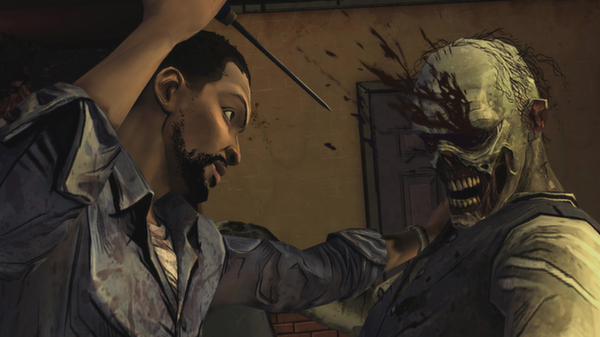 Perhaps what is most interesting about this games narrative is the way in which the player’s actions and decisions strongly influence how it plays out. While such features are not particularly revolutionary, the entire games framework is built upon this mechanic and so even the most subtle of things can escalade to story and character changes. During conversations, players have the opportunity to pick what Lee will say, with each piece of dialogue being different and therefore gaining different responses based upon player choice. As is typical of this genre, the player will spend a good chunk of their time conversing with the games wide and colourful cast, of which are brilliantly characterized due to excellent voice-acting. Lee in particular is a highlight, presenting a lot of depth to his character, expressing concern for fellow survivors and a displaying strong leadership, of which contrasts with his troubled past. He is very much shaped by the player’s choices, so it is through that which creates the attachment to him. Lee can behave in whatever manner you choose thanks to such an extensive amount of choice presented to you.
Perhaps what is most interesting about this games narrative is the way in which the player’s actions and decisions strongly influence how it plays out. While such features are not particularly revolutionary, the entire games framework is built upon this mechanic and so even the most subtle of things can escalade to story and character changes. During conversations, players have the opportunity to pick what Lee will say, with each piece of dialogue being different and therefore gaining different responses based upon player choice. As is typical of this genre, the player will spend a good chunk of their time conversing with the games wide and colourful cast, of which are brilliantly characterized due to excellent voice-acting. Lee in particular is a highlight, presenting a lot of depth to his character, expressing concern for fellow survivors and a displaying strong leadership, of which contrasts with his troubled past. He is very much shaped by the player’s choices, so it is through that which creates the attachment to him. Lee can behave in whatever manner you choose thanks to such an extensive amount of choice presented to you.
Aside from talking to characters, the player has the freedom to walk around the games confined levels and interact with the environment. It is here where the traditional Point And Click mechanics break through, with the player being able to select things to use/collect/look at. There are some notable cut backs though on this front, as the player never has direct access to their inventory, so players can expect no convoluted item combining, and sporadic item usage to solve puzzles. This does somewhat remove the game of its Point And Click identity, with an extremely streamlined experience, and simplified UI. This game is never that reliant on puzzles, and when they 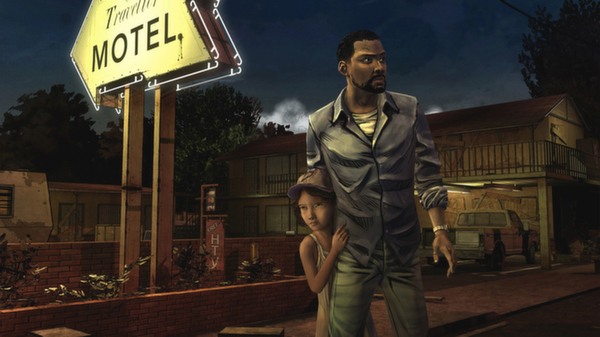 are presented to the player, they are easily solved. This is due in part to the fact that as default, objects that can be interacted with are highlighted, and because the option to use an item with a particular person/object is also highlighted as part of the UI, making any sense of challenge disappear and any need for brain power eliminated. Normally these flaws would be detrimental to the game, but it becomes clear very early on in this title that it isn’t strictly a Point And Click game, or at least not one like you’ve played before. While it does fall into that category, I would consider this more of an ‘Interactive Narrative’ more along the lines of the PS3 title: ‘Heavy Rain’. While such a likeness isn’t too strong, it certainly has more in common with it than an adventure game series like Monkey Island. The gameplay experience isn’t too deep, and largely the player finds themselves being carried along by cutscenes. While people may sneer, it is important to note that the cutscenes are brilliantly acted and directed, and they do extremely well to capture the TV style the game attempts to replicate. Such scenes are not devoid of player interaction however, and the player can be quickly thrust into a QTE (though these are used sparingly) or some other kind of player interaction. Gameplay can feel rather mundane at times, but this is easily remedied by simple, yet fun gameplay changes such as shoot outs and fighting.
are presented to the player, they are easily solved. This is due in part to the fact that as default, objects that can be interacted with are highlighted, and because the option to use an item with a particular person/object is also highlighted as part of the UI, making any sense of challenge disappear and any need for brain power eliminated. Normally these flaws would be detrimental to the game, but it becomes clear very early on in this title that it isn’t strictly a Point And Click game, or at least not one like you’ve played before. While it does fall into that category, I would consider this more of an ‘Interactive Narrative’ more along the lines of the PS3 title: ‘Heavy Rain’. While such a likeness isn’t too strong, it certainly has more in common with it than an adventure game series like Monkey Island. The gameplay experience isn’t too deep, and largely the player finds themselves being carried along by cutscenes. While people may sneer, it is important to note that the cutscenes are brilliantly acted and directed, and they do extremely well to capture the TV style the game attempts to replicate. Such scenes are not devoid of player interaction however, and the player can be quickly thrust into a QTE (though these are used sparingly) or some other kind of player interaction. Gameplay can feel rather mundane at times, but this is easily remedied by simple, yet fun gameplay changes such as shoot outs and fighting.
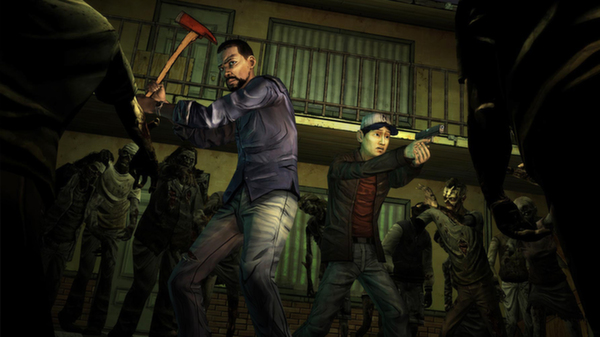 Drawing from the franchises Graphic Novel roots, the game takes on a similar art style, capturing the beauty of the 2D frames and placing it in 3d framework. The game displays one of the best examples of cartoon-like graphics, and this style contrasts perfectly with the bleak and extremely gory scenes that follow throughout each episodes 2 hour length. The game certainly is gorgeous to look at, and aside from the games moody environments that breathe with atmosphere, the character models are particularly well detailed, aside from a few crummy-looking zombie models.
Drawing from the franchises Graphic Novel roots, the game takes on a similar art style, capturing the beauty of the 2D frames and placing it in 3d framework. The game displays one of the best examples of cartoon-like graphics, and this style contrasts perfectly with the bleak and extremely gory scenes that follow throughout each episodes 2 hour length. The game certainly is gorgeous to look at, and aside from the games moody environments that breathe with atmosphere, the character models are particularly well detailed, aside from a few crummy-looking zombie models.
The Walking Dead universe really is beautifully realised across all 5 episodes, and Lee and Clementine’s journey takes them through a variety of different places, and through many plot twists keeping the story ever-interesting. If at any time the game starts to dip, the plot quickly thickens and the tension is turned up to 11, bringing the players attention straight back. The game relishes in well written narrative, which really is a credit to Robert Kirkman’s source material, and is able to sit aside his incredible work. It really speaks volumes when I am this eager to jump back into the game and experience it all again, and most importantly, making different choices to see how drastically it all changes.
Verdict
The game isn’t the longest you will play, but its impact is lasting. While the gameplay may leave veteran Point And Click fans wanting for a more fruitful experience, the 10 hour narrative is certainly of the highest calibre, and most certainly brings games closer to the medium of TV and Film. The characters, the emotion, and the overall production is of such high (and surprising) quality, that this game may very well have the ability to crossover to new audiences, and interest even that of non-gamers. I cannot possibly sing The Walking Dead’s praises enough, and it has to be said that this is one of the best games of this generation, and perhaps of all time. The narrative really is second to none.
Positives:
- Fully realised universe straight from the graphic novels.
- Great art style
- Amazing narrative
- Brilliant Cast Of Characters
- Amazing choice system that influences the narrative significantly.
Negatives:
- Not enough Point And Click gameplay as you would expect.
- Lacks any real challenge (especially with the puzzles).
Disclaimer:All scores given within our reviews are based on the artist’s personal opinion; this should in no way impede your decision to purchase the game.









You must be logged in to post a comment.